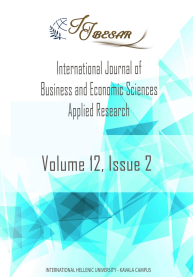The Effects of Structural Shocks on Macroeconomic Fundamentals under Aggressive Monetary Policy: The Case of Turkey
The Effects of Structural Shocks on Macroeconomic Fundamentals under Aggressive Monetary Policy: The Case of Turkey
Author(s): Mahmut Sami Gungor, Bülent GüloğluSubject(s): Geography, Regional studies, Economic policy, Transformation Period (1990 - 2010), Present Times (2010 - today), Financial Markets
Published by: Τεχνολογικό Εκπαιδευτικό Ίδρυμα Ανατολικής Μακεδονίας και Θράκης
Keywords: new keynesian model; bayesian estimation; monetary policy inertia; aggressive monetary policy; Turkey;
Summary/Abstract: This study aims to investigate the impact of aggressive monetary policy in terms of inflation on the effects of structural shocks over macroeconomic fundamentals in Turkey. For this purpose, we estimate the basic new Keynesian model by using the Bayesian method for the period of 2000Q1 to 2019Q1. We use the most recent quarterly dataset of the real gross domestic product index, consumer price index and short term interest rate for Turkey. The prior distribution of structural parameters and shock processes are determined according to the literature. Then, we estimate two different version of the basic new Keynesian model with six distinct chains of Metropolis-Hasting algorithm with each of 100000 draws. Finally, we examine the long term impact of aggressive monetary policy on the effects of structural shocks with the help of the unconditional variance decomposition. Besides, the short term and over time analysis are conducted via the conditional forecast error variance decompositions. The results of Bayesian impulse responses are consistent with theoretical framework of the new Keynesian synthesis. Besides, the historical shock decompositions of endogenous variables give valuable insight for the last twenty years of Turkish economy. The empirical results show that aggressive monetary policy increases the effects of monetary policy shock on inflation while its impact on output gap and interest rate decreases at every quarter. Moreover, the aggressive monetary policy boosts the effects of supply shock on the variability of output gap over time. If the Central Bank of Turkey intends to implement aggressive monetary policy to sustain price stability, the monetary authority should bear in mind that their effects on both the real sector and the short term interest rate will diminish. This study deals with the popular discussion about the aggressiveness of monetary authority in emerging countries with its own distinctive design.
Journal: International Journal of Business and Economic Sciences Applied Research (IJBESAR)
- Issue Year: 12/2019
- Issue No: 2
- Page Range: 7-21
- Page Count: 15
- Language: English

